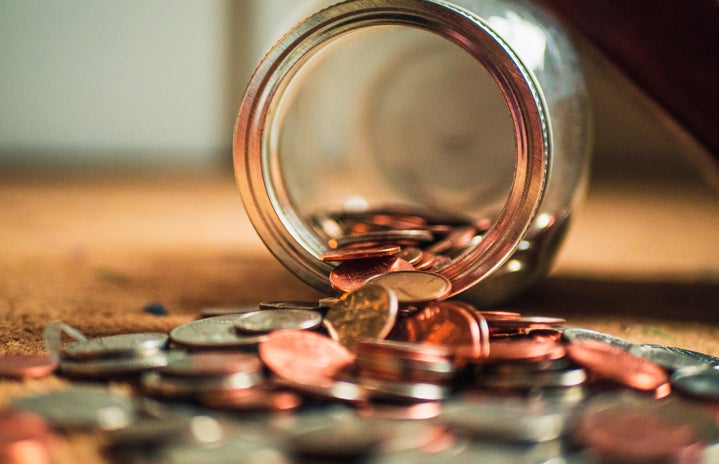Let’s talk about money. It’s taboo to discuss it — everyone wants some of it, and yet no one seems to have enough of it. Money has been on my mind ever since Refinery 29 released a book called Money Diaries, which is a compilation of spending habits from people of all walks of life. While flipping through a couple of pages at my local Target, I was inspired to finally pull my financial life together and asked some of the other girls at Her Campus UFL for help along the way. Here’s a quick guide to our favorite tips and tricks to budget our way to financial freedom.
1. Coupon like there’s no tomorrow
One of the greatest perks that comes with being a Florida Gator is receiving seasonal Gator Greenback coupon books. These little books are an absolute necessity for any college student who is on a budget. There are a ton of coupons for some of Gainesville’s best restaurants, deals on oil changes and even coupons for waxing and tanning services. Gator Greenbacks are always given out in residence hall mailboxes, but if you live off campus, don’t worry. At the beginning of each semester, there is always a volunteer standing in between Turlington and the Hub holding cardboard boxes filled to the brim with savings. Pro tip: Ask for two, and keep one in your backpack and the other in your car.
2. Sign up for rewards programs
Have you ever heard the phrase “it pays to be loyal”? When it comes to saving money, loyalty totally pays off. Joining loyalty and rewards programs for places where you frequently shop or dine is a great way to save a ton of money. Many restaurants offer loyalty programs that not only offer you free food on your birthday but also free meals or money towards your next meal just because you eat there frequently.
PR/Events team member Cameron Davidson only buys Starbucks when she remembers to bring her reusable coffee cup. She saves a few extra cents on her drink for bringing her own cup, and she’s also cutting down her plastic waste.
3. Swap your debit card for cash
I’m totally guilty of using apps to order my food in advance. It’s great every once in a while, but the act of pushing a button to authorize an order is becoming dangerous to my bank account. To kick your craving for buying another unnecessary meal or item, HC UFL video producer Adrianna Santiago suggests swapping your debit card for a certain amount of cash for the week. According to TwoCents, paying with cash instead of using a credit or debit card can actually prevent you from spending too much money. Setting and sticking to a certain budget for lunch each week is a whole lot easier when you use cash instead of card. Not only that, but you’ll be more likely to think through your purchases more than you would if you were paying electronically. After all, no one enjoys watching their money leave their hands.
4. Download a few money-saving apps
Apps are my all-time favorite way to make sure that I get a great deal on dinner for a night out. My personal favorite money-saving app is Hooked. Hooked is a great app for people who are spontaneous and open to eat whatever, wherever. The app has a list of deals each day that are only available for a certain time frame, usually three or four hours. Each deal has a timer at the bottom that lets you know how much longer the deal will be available, and once it’s gone, it’s gone.
Another money-saving app is ibotta, which is not as well-known but definitely on the rise. It’s basically a cash-back reward app that allows you to earn cash for buying certain products at participating stores. So when you see that Publix is a participating store and you earn $1 for every three boxes of cookies you buy, you’re essentially making money to eat your favorite dessert.
HC UFL’s morale leader Kayla Lane and feature writer Britney Jenkins are total #girlbosses when it comes to using apps to save money at the grocery store. Lane suggests you keep an eye out for BOGO sales at grocery stores, and Jenkins says the best way to do that is by downloading apps for grocery stores and comparing prices before you shop. By using apps and shopping sales, you’ll be on your way to financial stability in no time.
5. Take your budget seriously
Long-term budgeting and financial planning can seem really intimidating for a college student. HC UFL PR/Events member Natasha Hernández suggests that you try to put half of your paycheck in your savings account every payday. This is great tip for everyone who typically spends less money than they earn. Establishing the habit of always putting money aside will make your savings account feel fuller than ever. If you’re like me and spend most of the money you make at your minimum wage job on expenses, there are a few apps that are perfect for budgeting.
Editor-in-Chief Darcy Schilds suggests an app like Mint, which helps you organize and stick to your spending habits, while feature writer Victoria Salamón prefers apps like Robinhood and Stash, which are the perfect resources for anyone who is interested in investing.
Being a college student on a budget doesn’t have to be tougher than waking up for an 8 a.m. class. With a few apps, coupon books and a little more planning, you could be on your way to making budgeting look easy.


